- Home
- Arthur Conan Doyle
The Last of the Legions and Other Tales of Long Ago Page 12
The Last of the Legions and Other Tales of Long Ago Read online
Page 12
XII
A POINT OF CONTACT
A curious train of thought is started when one reflects upon those greatfigures who have trod the stage of this earth, and actually played theirparts in the same act, without ever coming face to face, or even knowingof each other's existence. Baber, the Great Mogul, was, for example,overrunning India at the very moment when Hernando Cortez wasoverrunning Mexico, and yet the two could never have heard of eachother. Or, to take a more supreme example, what could the EmperorAugustus Caesar know of a certain Carpenter's shop wherein there worked adreamy-eyed boy who was destined to change the whole face of the world?It may be, however, that sometimes these great contemporary forces didapproach, touch, and separate--each unaware of the true meaning of theother. So it was in the instance which is now narrated.
It was evening in the port of Tyre, some eleven hundred years beforethe coming of Christ. The city held, at that time, about a quarter of amillion of inhabitants, the majority of whom dwelt upon the mainland,where the buildings of the wealthy merchants, each in its own tree-girtgarden, extended for seven miles along the coast. The great island,however, from which the town got its name, lay out some distance fromthe shore, and contained within its narrow borders the more famous ofthe temples and public buildings. Of these temples the chief was that ofMelmoth, which covered with its long colonnades the greater part of thatside of the island which looked down upon the Sidonian port, so calledbecause only twenty miles away the older city of Sidon maintained aconstant stream of traffic with its rising offshoot.
Inns were not yet in vogue, but the poorer traveller found his quarterswith hospitable citizens, while men of distinction were frequentlyhoused in the annex of the temples, where the servants of the priestsattended to their wants. On that particular evening there stood in theportico of the temple of Melmoth two remarkable figures who were thecentre of observation for a considerable fringe of Ph[oe]nician idlers.One of these men was clearly by his face and demeanour a greatchieftain. His strongly-marked features were those of a man who had ledan adventurous life, and were suggestive of every virile quality frombrave resolve to desperate execution. His broad, high brow andcontemplative eyes showed that he was a man of wisdom as well as ofvalour. He was clad, as became a Greek nobleman of the period, with apure white linen tunic, a gold-studded belt supporting a short sword,and a purple cloak. The lower legs were bare, and the feet covered bysandals of red leather, while a cap of white cloth was pushed back uponhis brown curls, for the heat of the day was past and the evening breezemost welcome.
His companion was a short, thick-set man, bull-necked and swarthy, cladin some dusky cloth which gave him a sombre appearance relieved only bythe vivid scarlet of his woollen cap. His manner towards his comrade wasone of deference, and yet there was in it also something of thatfreshness and frankness which go with common dangers and a commoninterest.
"Be not impatient, sire," he was saying. "Give me two days, or three atthe most, and we shall make as brave a show at the muster as any. But,indeed, they would smile if they saw us crawl up to Tenedos with tenmissing oars and the mainsail blown into rags."
The other frowned and stamped his foot with anger.
"We should have been there now had it not been for this cursedmischance," said he. "Aeolus played us a pretty trick when he sent sucha blast out of a cloudless sky."
"Well, sire, two of the Cretan galleys foundered, and Trophimes, thepilot, swears that one of the Argos ships was in trouble. Pray Zeus thatit was not the galley of Menelaus. We shall not be the last at themuster."
"It is well that Troy stands a good ten miles from the sea, for if theycame out at us with a fleet they might have us at a disadvantage. We hadno choice but to come here and refit, yet I shall have no happy houruntil I see the white foam from the lash of our oars once more. Go,Seleucas, and speed them all you may."
The officer bowed and departed, while the chieftain stood with his eyesfixed upon his great dismantled galley over which the riggers andcarpenters were swarming. Further out in the roadstead lay eleven othersmaller galleys, waiting until their wounded flagship should be readyfor them. The sun, as it shone upon them, gleamed upon hundreds ofbronze helmets and breastplates, telling of the warlike nature of theerrand upon which they were engaged. Save for them the port was filledwith bustling merchant ships taking in cargoes or disgorging them uponthe quays. At the very feet of the Greek chieftain three broad bargeswere moored, and gangs of labourers with wooden shovels were heaving outthe mussels brought from Dor, destined to supply the famous Tyriandye-works which adorn the most noble of all garments. Beside them was atin ship from Britain, and the square boxes of that precious metal, soneedful for the making of bronze, were being passed from hand to hand tothe waiting waggons. The Greek found himself smiling at the uncouthwonder of a Cornishman who had come with his tin, and who was now lostin amazement as he stared at the long colonnades of the Temple ofMelmoth and the high front of the Shrine of Ashtaroth behind it. Evenas he gazed some of his ship-mates passed their hands through his armsand led him along the quay to a wine-shop, as being a building much morewithin his comprehension. The Greek, still smiling, was turning on hisheels to return to the Temple, when one of the clean-shaven priests ofBaal came towards him.
"It is rumoured, sire," said he, "that you are on a very distant anddangerous venture. Indeed, it is well known from the talk of yoursoldiers what it is that you have on hand."
"It is true," said the Greek, "that we have a hard task before us. Butit would have been harder to bide at home and to feel that the honour ofa leader of the Argives had been soiled by this dog from Asia."
"I hear that all Greece has taken up the quarrel."
"Yes, there is not a chief from Thessaly to the Malea who has not calledout his men, and there were twelve hundred galleys in the harbour ofAulis."
"It is a great host," said the priest. "But have ye any seers orprophets among ye who can tell what will come to pass?"
"Yes, we had one such, Calchas his name. He has said that for nine yearswe shall strive, and only on the tenth will the victory come."
"That is but cold comfort," said the priest. "It is, indeed, a greatprize which can be worth ten years of a man's life."
"I would give," the Greek answered, "not ten years but all my life if Icould but lay proud Ilium in ashes and carry back Helen to her palace onthe hill of Argos."
"I pray Baal, whose priest I am, that you may have good fortune," saidthe Ph[oe]nician. "I have heard that these Trojans are stout soldiers,and that Hector, the son of Priam, is a mighty leader."
The Greek smiled proudly.
"They must be stout and well-fed also," said he, "if they can stand thebrunt against the long-haired Argives with such captains as Agamemnon,the son of Atreus from golden Mycenae, or Achilles, son of Peleus, withhis myrmidons. But these things are on the knees of the Fates. In themeantime, my friend, I would fain know who these strange people are whocome down the street, for their chieftain has the air of one who is madefor great deeds."
A tall man clad in a long white robe, with a golden fillet runningthrough his flowing auburn hair, was striding down the street with thefree elastic gait of one who has lived an active life in the open. Hisface was ruddy and noble, with a short, crisp beard covering a strong,square jaw. In his clear blue eyes as he looked at the evening sky andthe busy waters beneath him there was something of the exaltation of thepoet, while a youth walking beside him and carrying a harp hinted at thegraces of music. On the other side of him, however, a second squire borea brazen shield and a heavy spear, so that his master might never becaught unawares by his enemies. In his train there came a tumultuousrabble of dark hawk-like men, armed to the teeth, and peering about withcovetous eyes at the signs of wealth which lay in profusion around them.They were swarthy as Arabs, and yet they were better clad and betterarmed than the wild children of the desert.
"They are but barbarians," said the priest. "He is a small king from themountain parts opposite Philistia, and h
e comes here because he isbuilding up the town of Jebus, which he means to be his chief city. Itis only here that he can find the wood, and stone, and craftsmanshipthat he desires. The youth with the harp is his son. But I pray you,chief, if you would know what is before you at Troy, to come now intothe outer hall of the Temple with me, for we have there a famous seer,the prophetess Alaga who is also the priestess of Ashtaroth. It may bethat she can do for you what she has done for many others, and send youforth from Tyre in your hollow ships with a better heart than you came."
To the Greeks, who by oracles, omens, and auguries were for ever pryinginto the future, such a suggestion was always welcome. The Greekfollowed the priest to the inner sanctuary, where sat the famousPythoness--a tall, fair woman of middle age, who sat at a stone tableupon which was an abacus or tray filled with sand. She held a style ofchalcedony, and with this she traced strange lines and curves upon thesmooth surface, her chin leaning upon her other hand and her eyes castdown. As the chief and the priest approached her she did not look up,but she quickened the movements of her pencil, so that curve followedcurve in quick succession. Then, still with downcast eyes, she spoke ina strange, high, sighing voice like wind amid the trees.
"Who, then, is this who comes to Alaga of Tyre, the handmaiden of greatAshtaroth? Behold I see an island to the west, and an old man who is thefather, and the great chief, and his wife, and his son who now waits himat home, being too young for the wars. Is this not true?"
"Yes, maiden, you have said truth," the Greek answered.
"I have had many great ones before me, but none greater than you, forthree thousand years from now people will still talk of your bravery andof your wisdom. They will remember also the faithful wife at home, andthe name of the old man, your father, and of the boy your son--all willbe remembered when the very stones of noble Sidon and royal Tyre are nomore."
"Nay, say not so, Alaga!" cried the priest.
"I speak not what I desire but what it is given to me to say. For tenyears you will strive, and then you will win, and victory will bringrest to others, but only new troubles to you. Ah!" The prophetesssuddenly started in violent surprise, and her hand made ever fastermarkings on the sand.
"What is it that ails you, Alaga?" asked the priest.
The woman had looked up with wild inquiring eyes. Her gaze was neitherfor the priest nor for the chief, but shot past them to the furtherdoor. Looking round the Greek was aware that two new figures had enteredthe room. They were the ruddy barbarian whom he had marked in thestreet, together with the youth who bore his harp.
"It is a marvel upon marvels that two such should enter my chamber onthe same day," cried the priestess. "Have I not said that you were thegreatest that ever came, and yet behold here is already one who isgreater. For he and his son--even this youth whom I see before me--willalso be in the minds of all men when lands beyond the Pillars ofHercules shall have taken the place of Ph[oe]nicia and of Greece. Hailto you, stranger, hail! Pass on to your work for it awaits you, and itis great beyond words of mine." Rising from her stool the woman droppedher pencil upon the sand and passed swiftly from the room.
"It is over," said the priest. "Never have I heard her speak suchwords."
The Greek chief looked with interest at the barbarian. "You speakGreek?" he asked.
"Indifferently well," said the other. "Yet I should understand it seeingthat I spent a long year at Ziklag in the land of the Philistines."
"It would seem," said the Greek, "that the gods have chosen us both toplay a part in the world."
"Stranger," the barbarian answered, "there is but one God."
"Say you so? Well, it is a matter to be argued at some better time. ButI would fain have your name and style and what is it you purpose to do,so that we may perchance hear of each other in the years to come. For mypart I am Odysseus, known also as Ulysses, the King of Ithaca, with thegood Laertes as my father and young Telemachus as my son. For my work,it is the taking of Troy."
"And my work," said the barbarian, "is the building of Jebus, which nowwe call Jerusalem. Our ways lie separate, but it may come back to yourmemory that you have crossed the path of David, second King of theHebrews, together with his young son Solomon, who may follow him uponthe throne of Israel."
So he turned and went forth into the darkened streets where his spearmenwere awaiting him, while the Greek passed down to his boat that he mightsee what was still to be done ere he could set forth upon his voyage.

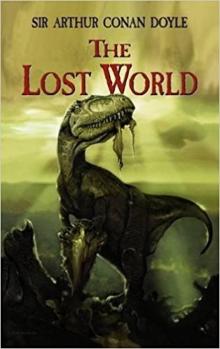 The Lost World
The Lost World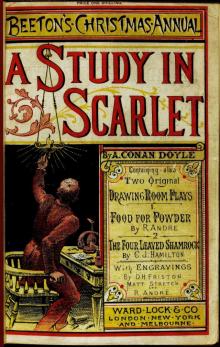 A Study in Scarlet
A Study in Scarlet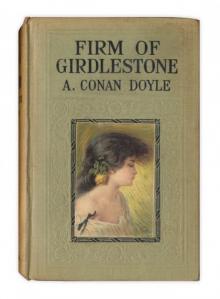 The Firm of Girdlestone
The Firm of Girdlestone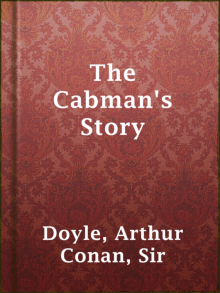 The Cabman's Story
The Cabman's Story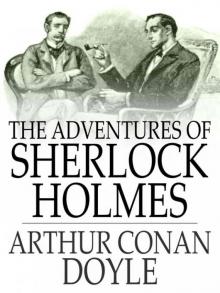 The Adventures of Sherlock Holmes
The Adventures of Sherlock Holmes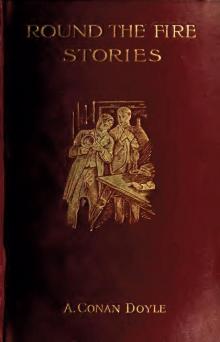 Round the Fire Stories
Round the Fire Stories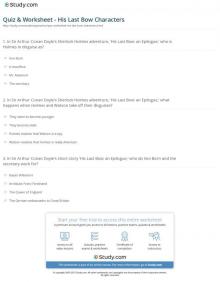 His Last Bow: An Epilogue of Sherlock Holmes
His Last Bow: An Epilogue of Sherlock Holmes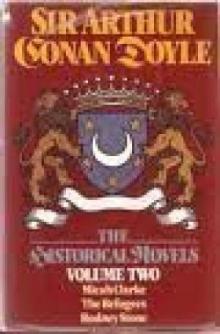 Micah Clarke
Micah Clarke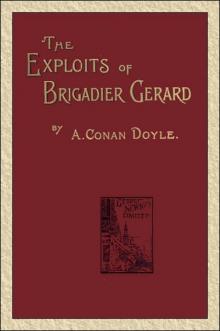 The Exploits of Brigadier Gerard
The Exploits of Brigadier Gerard The Gully of Bluemansdyke, and Other stories
The Gully of Bluemansdyke, and Other stories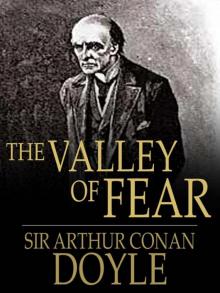 The Valley of Fear
The Valley of Fear The Last of the Legions and Other Tales of Long Ago
The Last of the Legions and Other Tales of Long Ago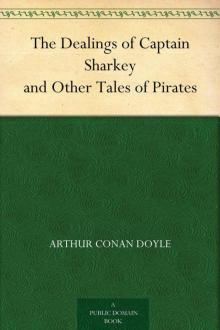 The Dealings of Captain Sharkey, and Other Tales of Pirates
The Dealings of Captain Sharkey, and Other Tales of Pirates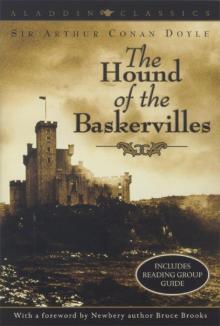 The Hound of the Baskervilles
The Hound of the Baskervilles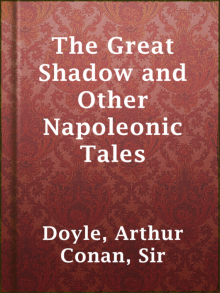 The Great Shadow and Other Napoleonic Tales
The Great Shadow and Other Napoleonic Tales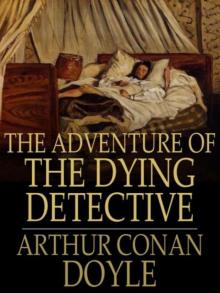 The Adventure of the Dying Detective
The Adventure of the Dying Detective The Man from Archangel, and Other Tales of Adventure
The Man from Archangel, and Other Tales of Adventure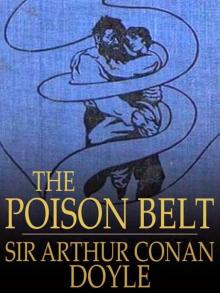 The Poison Belt
The Poison Belt The Last Galley; Impressions and Tales
The Last Galley; Impressions and Tales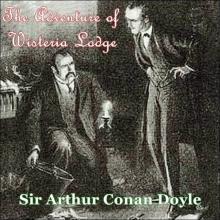 The Adventure of Wisteria Lodge
The Adventure of Wisteria Lodge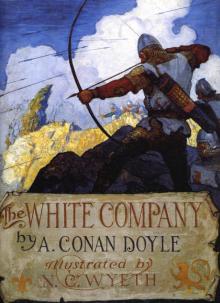 The White Company
The White Company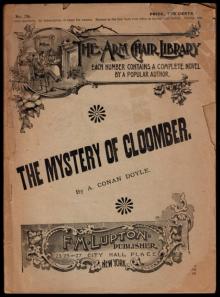 The Mystery of Cloomber
The Mystery of Cloomber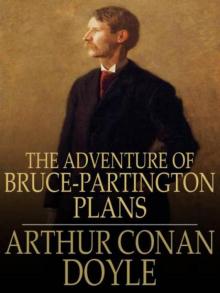 The Adventure of the Bruce-Partington Plans
The Adventure of the Bruce-Partington Plans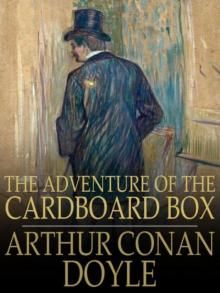 The Adventure of the Cardboard Box
The Adventure of the Cardboard Box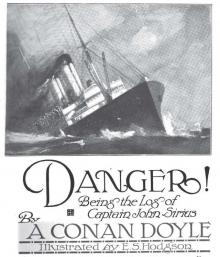 Danger! and Other Stories
Danger! and Other Stories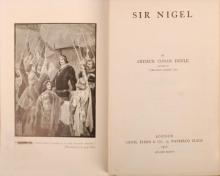 Sir Nigel
Sir Nigel The Return of Sherlock Holmes
The Return of Sherlock Holmes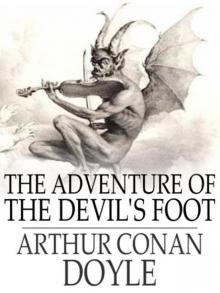 The Adventure of the Devil's Foot
The Adventure of the Devil's Foot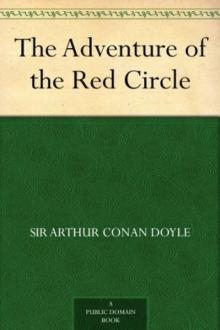 The Adventure of the Red Circle
The Adventure of the Red Circle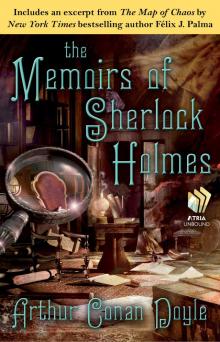 The Memoirs of Sherlock Holmes
The Memoirs of Sherlock Holmes The Adventure of the Yellow Face
The Adventure of the Yellow Face The Adventure of the Norwood Builder
The Adventure of the Norwood Builder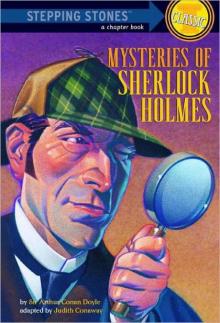 Mysteries of Sherlock Holmes
Mysteries of Sherlock Holmes The Adventure of the Missing Three-Quarter
The Adventure of the Missing Three-Quarter The Adventure of the Final Problem
The Adventure of the Final Problem A Scandal in Bohemia
A Scandal in Bohemia His Last Bow shssc-4
His Last Bow shssc-4 Beyond The City
Beyond The City The Adventure of the Gloria Scott
The Adventure of the Gloria Scott The Parasite
The Parasite The Land Of Mist pcs-3
The Land Of Mist pcs-3 The Adventure of the Musgrave Ritual
The Adventure of the Musgrave Ritual The Complete Sherlock Holmes, Volume I (Barnes & Noble Classics Series)
The Complete Sherlock Holmes, Volume I (Barnes & Noble Classics Series) The Adventure of the Stockbroker's Clerk
The Adventure of the Stockbroker's Clerk The Adventure of the Copper Beeches
The Adventure of the Copper Beeches The New Annotated Sherlock Holmes
The New Annotated Sherlock Holmes When The World Screamed pcs-5
When The World Screamed pcs-5 The Adventure of the Six Napoleons
The Adventure of the Six Napoleons The Case Book of Sherlock Holmes shssc-5
The Case Book of Sherlock Holmes shssc-5 The Sign of Four
The Sign of Four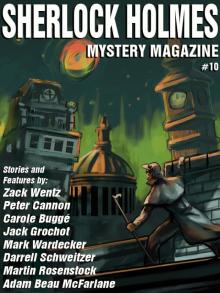 Sherlock Holmes Mystery Magazine #10
Sherlock Holmes Mystery Magazine #10 The Adventures of Brigadier Gerard
The Adventures of Brigadier Gerard The Adventure of the Second Stain
The Adventure of the Second Stain The Adventure of the Engineer's Thumb
The Adventure of the Engineer's Thumb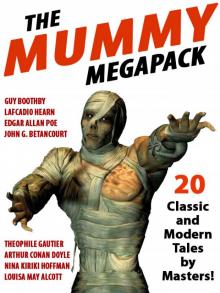 The Mummy Megapack
The Mummy Megapack The Disintegration Machine pcs-4
The Disintegration Machine pcs-4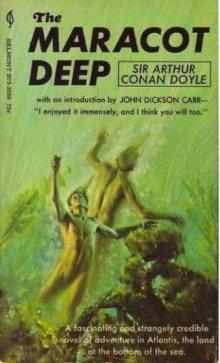 The Maracot Deep
The Maracot Deep The Five Orange Pips
The Five Orange Pips The Adventure of the Crooked Man
The Adventure of the Crooked Man The Adventure of the Blue Carbuncle
The Adventure of the Blue Carbuncle The Adventure of Silver Blaze
The Adventure of Silver Blaze The Adventure of the Solitary Cyclist
The Adventure of the Solitary Cyclist The Adventure of the Naval Treaty
The Adventure of the Naval Treaty Sherlock Holmes. The Complete Stories
Sherlock Holmes. The Complete Stories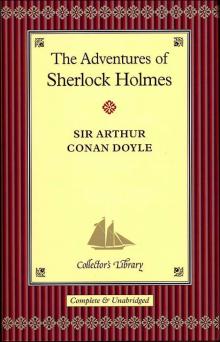 The Adventures of Sherlock Holmes (sherlock holmes)
The Adventures of Sherlock Holmes (sherlock holmes) The Adventure of the Empty House
The Adventure of the Empty House The Narrative of John Smith
The Narrative of John Smith The Return of Sherlock Holmes (sherlock holmes)
The Return of Sherlock Holmes (sherlock holmes) The New Revelation
The New Revelation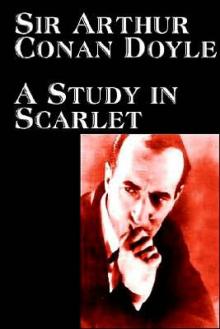 A Study in Scarlet (sherlock holmes)
A Study in Scarlet (sherlock holmes) The Vital Message
The Vital Message Sherlock Holmes Complete Collection
Sherlock Holmes Complete Collection Round the Red Lamp
Round the Red Lamp The Boscombe Valley Mystery
The Boscombe Valley Mystery The Adventure of the Beryl Coronet
The Adventure of the Beryl Coronet The Refugees
The Refugees The Adventure of the Three Students.
The Adventure of the Three Students.